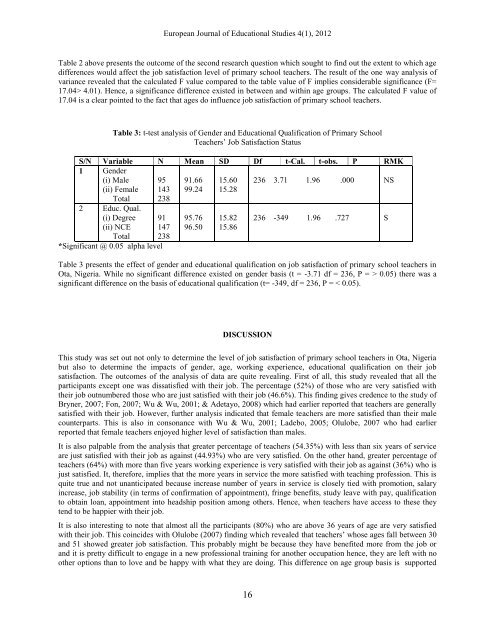Volume 4 Issue 1 (February 2012) - Ozean Publications
Volume 4 Issue 1 (February 2012) - Ozean Publications
Volume 4 Issue 1 (February 2012) - Ozean Publications
You also want an ePaper? Increase the reach of your titles
YUMPU automatically turns print PDFs into web optimized ePapers that Google loves.
European Journal of Educational Studies 4(1), <strong>2012</strong><br />
Table 2 above presents the outcome of the second research question which sought to find out the extent to which age<br />
differences would affect the job satisfaction level of primary school teachers. The result of the one way analysis of<br />
variance revealed that the calculated F value compared to the table value of F implies considerable significance (F=<br />
17.04> 4.01). Hence, a significance difference existed in between and within age groups. The calculated F value of<br />
17.04 is a clear pointed to the fact that ages do influence job satisfaction of primary school teachers.<br />
Table 3: t-test analysis of Gender and Educational Qualification of Primary School<br />
Teachers‟ Job Satisfaction Status<br />
S/N Variable N Mean SD Df t-Cal. t-obs. P RMK<br />
1 Gender<br />
(i) Male<br />
(ii) Female<br />
Total<br />
95<br />
143<br />
238<br />
91.66<br />
99.24<br />
15.60<br />
15.28<br />
236 3.71 1.96 .000 NS<br />
2 Educ. Qual.<br />
(i) Degree<br />
(ii) NCE<br />
Total<br />
*Significant @ 0.05 alpha level<br />
91<br />
147<br />
238<br />
95.76<br />
96.50<br />
15.82<br />
15.86<br />
236 -349 1.96 .727 S<br />
Table 3 presents the effect of gender and educational qualification on job satisfaction of primary school teachers in<br />
Ota, Nigeria. While no significant difference existed on gender basis (t = -3.71 df = 236, P = > 0.05) there was a<br />
significant difference on the basis of educational qualification (t= -349, df = 236, P = < 0.05).<br />
DISCUSSION<br />
This study was set out not only to determine the level of job satisfaction of primary school teachers in Ota, Nigeria<br />
but also to determine the impacts of gender, age, working experience, educational qualification on their job<br />
satisfaction. The outcomes of the analysis of data are quite revealing. First of all, this study revealed that all the<br />
participants except one was dissatisfied with their job. The percentage (52%) of those who are very satisfied with<br />
their job outnumbered those who are just satisfied with their job (46.6%). This finding gives credence to the study of<br />
Bryner, 2007; Fon, 2007; Wu & Wu, 2001; & Adetayo, 2008) which had earlier reported that teachers are generally<br />
satisfied with their job. However, further analysis indicated that female teachers are more satisfied than their male<br />
counterparts. This is also in consonance with Wu & Wu, 2001; Ladebo, 2005; Olulobe, 2007 who had earlier<br />
reported that female teachers enjoyed higher level of satisfaction than males.<br />
It is also palpable from the analysis that greater percentage of teachers (54.35%) with less than six years of service<br />
are just satisfied with their job as against (44.93%) who are very satisfied. On the other hand, greater percentage of<br />
teachers (64%) with more than five years working experience is very satisfied with their job as against (36%) who is<br />
just satisfied. It, therefore, implies that the more years in service the more satisfied with teaching profession. This is<br />
quite true and not unanticipated because increase number of years in service is closely tied with promotion, salary<br />
increase, job stability (in terms of confirmation of appointment), fringe benefits, study leave with pay, qualification<br />
to obtain loan, appointment into headship position among others. Hence, when teachers have access to these they<br />
tend to be happier with their job.<br />
It is also interesting to note that almost all the participants (80%) who are above 36 years of age are very satisfied<br />
with their job. This coincides with Olulobe (2007) finding which revealed that teachers‟ whose ages fall between 30<br />
and 51 showed greater job satisfaction. This probably might be because they have benefited more from the job or<br />
and it is pretty difficult to engage in a new professional training for another occupation hence, they are left with no<br />
other options than to love and be happy with what they are doing. This difference on age group basis is supported<br />
16

















